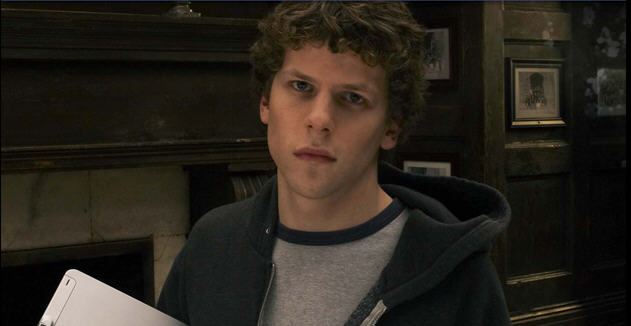
Jessie Eisenberg as Mark Zuckerberg in The Social Network (Credit: Columbia Pictures)
I didn’t discuss The Social Network movie with Mark Zuckerberg when I interviewed him in May but I have talked with others who expected it to be a hatchet job. But that’s not what I took away from the movie. The film certainly implied that Zuckerberg may have stolen the idea from the Winklevoss brothers and that he did nothing to prevent the company from deceiving co-founder Eduardo Saverin into signing away his share of the company but, on balance, Zuckerberg seemed more driven than evil.
It portrayed a young man who was not only tenacious but focused on what matters when it comes to building a lasting web property. At various points in the film, Saverin pressured Zuckerberg to let him sell advertising but Zuckerberg understood that you first have to build a site that people love before you can start to monetize it. And that’s exactly what he did. Despite its critics and its various privacy snafus, millions of people love Facebook and it is fast becoming a very profitable business.
Mostly the movie portrayed a young man with a vision. From the beginning, Zuckerberg understood the power of connections and the power of friendship. In the movie he had some challenges when it came to his own real-world friends, but he certainly knew the power of helping others stay connected to their friends. In the movie, after being suspended from Harvard for hacking into campus servers to gather pictures for his first website – one that let students compare the relative attractiveness of female Harvard students, he commented that the power of that site was not that it depicted pretty girls (the Internet has plenty of those pictures) but pretty girls that Harvard students actually know. And later in the film, when talking about the early success of Facebook, he commented that it was all about users being interconnected.
The movie also clarified Facebook’s growth strategy which was based on exclusivity. It started at Harvard and then migrated to Yale, Columbia and Stanford before being rolled out to other colleges, then corporations and finally the general public. My own kids were at Whitman College and UCLA during Facebook’s expansion period and I remember how excited they were when Facebook finally came to their campuses. When it expanded to companies, I was excited when I got to sign up by virtue of having a corporate email address and when it finally opened up to everyone, it was a club that people actually were happy to join, especially compared to its main competitor – MySpace – which looked like it was located in the Web’s low-rent district.
After watching the film, I don’t think less of Mark Zuckerberg. If anything, it gave me a better appreciation for his genius – not just as a nerdy coder but as one of the first people to truly understand the power of social media.
Disclosure: Larry Magid is co-director of ConnectSafely.org, a non-profit Internet safety organization which receives some of its funding from Facebook.
Be the first to comment